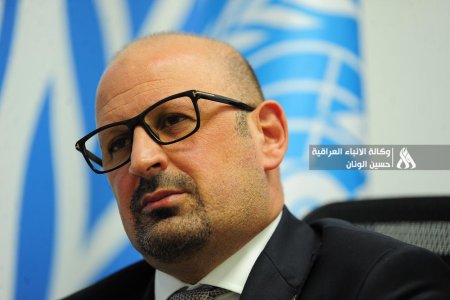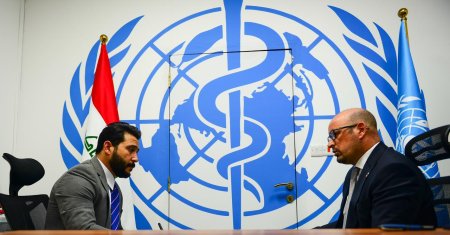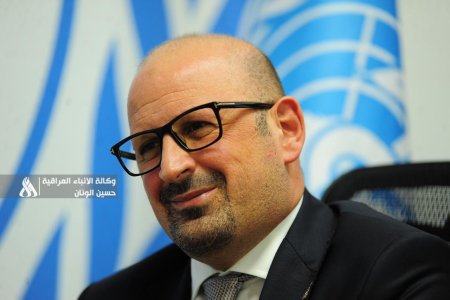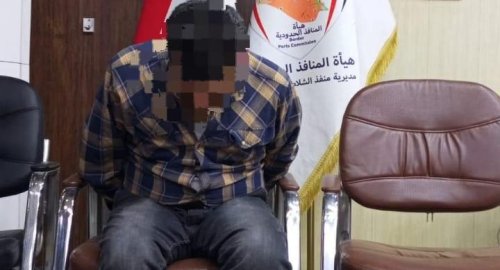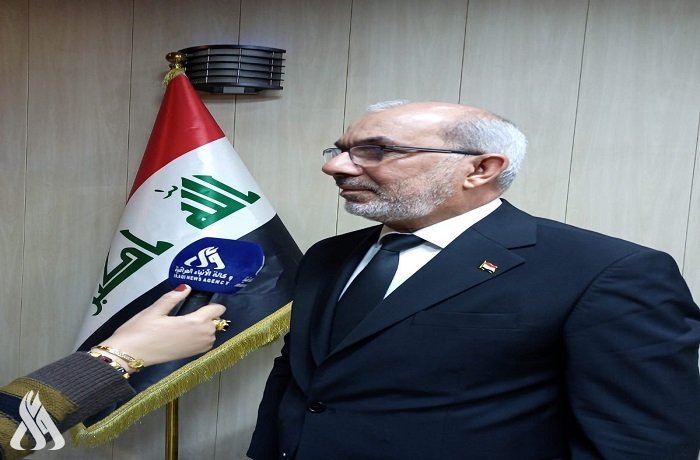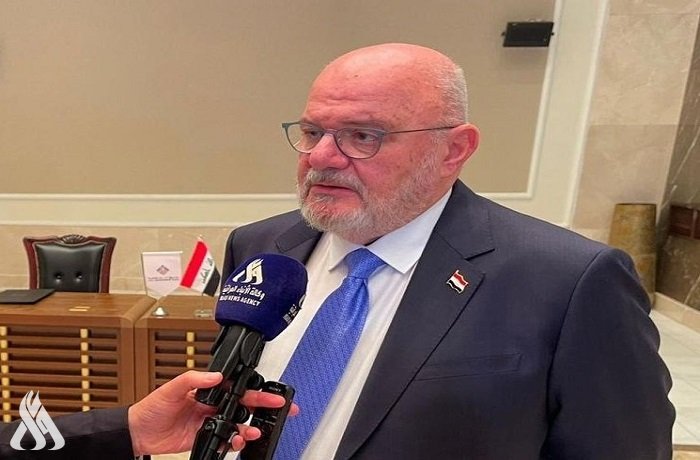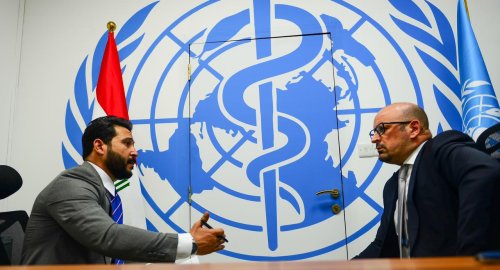
WHO: The Iraqi health sector suffers from the absence of strategic modernization plans

Investigations and reports
- 15-02-2022, 21:08
Baghdad - INA
Harith Al-Abadi
The World Health Organization announced, today, Tuesday, the endeavor to raise the level of vaccination in Iraq to 75% in the middle of this year, and while noting that Iraq has passed the fourth wave, it also confirmed the start of work on rebuilding health information systems.
The representative of the World Organization in Iraq, Dr. Ahmed Zouiten, said in an interview with the Iraqi News Agency (INA) by Harith Al-Abadi , that "the World Health Organization is working in 194 countries from all over the world to promote the highest level of health that can be reached for all people without regard to race, religion, political belief or The economic or social situation,” noting that “our message lies in promoting health and preserving the safety of the world and the vulnerable groups. Access to adequate and affordable health care is a human right, and comprehensive health care is a fundamental principle guiding the work of the organization.”
Zouiten added, "This became more practical and clearer after the announcement of the Corona 19 pandemic, which swept the world nearly two years ago, and Iraq is one of the countries in the world that was affected by this pandemic due to the great challenges that the health sector in Iraq suffered," noting that "the role of the organization is supportive."Technical, and relied on direct coordination and close communication with the Iraqi Ministry of Health and its departments and institutions throughout Iraq.
Zouiten stressed that "our contributions are numerous, including those related to supporting health programs in the field of communicable and non-communicable diseases, developing strategies for response programs and preventing violence and injuries that may lead to disability, in addition to mental health and emergency programs," noting that "one of our current priorities is to support the role of the ministry and its institutions." The Ministry of Health in responding to the requirements of prevention and vaccination against the Corona pandemic and raising the vaccination rates to reach the level of 75% in the middle of this year.
And he added, "The World Health Organization has held several awareness-raising workshops about the dangers of corona and not taking the vaccine, which included all governorates of Iraq, in addition to a number of other specialized training workshops in the field of case management and response to epidemic emergencies, and so on," explaining that "the organization gathers a group of experts in the field of health from All over the world to contribute to providing the appropriate scientific and technical recommendations to improve the health system in Iraq and start implementing the comprehensive health coverage program and building modern information systems.
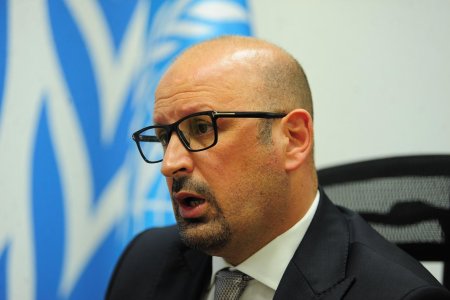
The role of the organization in Iraq
WHO representative added that "the role of the organization in Iraq includes many activities and programs, including awareness-raising, including those related to logistical support, such as preparing laboratory equipment and providing medical supplies, in addition to a large number of strategic programs related to supporting the Ministry of Health in building a health information system and a comprehensive health coverage program and systems Epidemiological survey and many others.
Assessment of the Iraqi health system
Dr. Ahmed Zouiten stated that "the health sector in Iraq has been subjected for more than 3 decades to a lot of pressures and erosion in the infrastructure due to instability and deterioration in the levels of health and medical services in the absence of strategic modernization plans to advance this vital sector within the comprehensive development system. The decline in health conditions during periods of war and instability led to a decrease in the average life expectancy at birth from 65 years in 1987 to 58.2 years in 2006.
Zouiten said, "We have to take serious and quick steps to advance these indicators and improve the health reality in terms of the quantity and quality of services provided, and future programs and projects," noting that "the health sector is one of the sectors that requires a great deal of sustainability, modernization and continuous development at the level of infrastructure and the level of services provided, as well as The local capabilities of the medical and health cadres working in it, and this requires a sufficient budget to contain the progress made in the various medical and scientific fields, and takes into account the population expansion, which in turn requires the expansion of the field of medical services provided at its three levels (primary, secondary and specialized or third medical services).
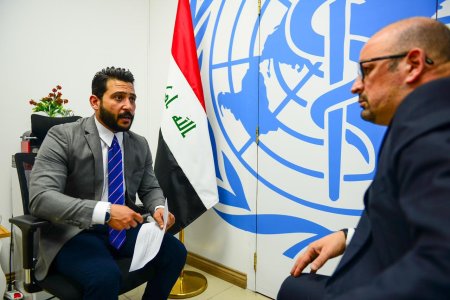
And he indicated that "Iraq needs to build hospitals and additional health institutions to contain the population increase and cover the need for primary health care and emergency services in the areas where the displaced and refugees, as well as the returnees in the liberated areas, are still in the process of reconstruction and reconstruction, including its health institutions."
Supporting Iraq financially
WHO explained that “the global organization is a technical agency and not a funding agency, as it is proud to provide technical advice and not financial support, and that technical support provides the latest information and medical know-how to various member states around the world,” noting that “in Iraq, as well as in other countries On the other hand, there is no specific annual budget to support the organization’s programs, but the budget changes annually, and this support may increase in response to crises and emergencies, including conflicts, epidemics and other types of disasters, including natural ones.
He stressed that the World Health Organization "has provided more than 33 million dollars in aid to the Ministry of Health to support the national program to respond to the Corona pandemic," expressing his thanks to "the donor countries that helped us provide this support, such as Germany, the European Union, the United States Office for Humanitarian Aid, in addition to the State of Kuwait and a number of others." One of the countries whose contributions helped sustain this support, which included various areas of need.
Zouiten pointed out that "the Ministry of Health and its departments in all Iraqi governorates have a major role in dealing with the rapid spread of the virus and its variants, as well as preparing and preparing emergency care supplies in hospitals."
He explained that the World Health Organization "has designated hospitals for isolation units and care for Corona patients last year, and we saw how global health systems collapsed in front of the huge numbers of injuries, but with the efforts of specialists in the health sector, we were able to maintain balanced rates, and we noticed the decline of the epidemiological curve of the disease before the month of 8 this year." As the number of cases reached 100 infections per day, the world witnessed a new rise with the entry of the Omicron mutant, and our graphic curve began to rise and then decline again in the past few days, reaching 5,000 infections or a little more.
Ranking of the Iraqi health sector internationally
He continued, "The latest figures we have at the local level in Iraq for the number of beneficiaries of the two doses in Iraq until the ninth of February, the total doses provided reached: 15,951,229 - 22.9% received one dose, while 15.6% received two doses, while the number of deaths until the mentioned date, the total locally reached 24,678 Death and the total number of infected people amounted to more than
2273535 , and this can be compared with the number recorded in neighboring countries," noting that "the number of vaccines is on the rise and we hope to reach a rate of 75% by the end of June.
He stated that "the ability of the current gene sequencing allows to obtain some information about the circulating genotype, and recent samples showed up to 80% of the OMICRON type, and this rate may grow to be higher in the next few weeks as this genotype spreads very quickly," explaining that "This genotype usually reduces the possibility of hospitalization with less severe symptoms than the previous types, and therefore we do not see any clear indications of the advent of any difficult days with the start of a decrease in infections, but this is only in the case of taking the vaccine and adhering to the preventive measures confirmed by the Ministry and its health departments On a daily basis and through the various media and social media platforms in all governorates of Iraq.
And he said, "We have learned how to deal with the virus with great caution, and the current data shows an encouraging decline, but the course of the epidemic may change suddenly because the ongoing mutations may change the nature of the virus," noting that "Iraq has crossed the fourth wave, but again only by taking the vaccine and following the means of prevention. Such as wearing a mask, cleaning hands constantly, and realizing the importance of social distancing.
The fate of the corona mutant
Zouiten explained, “There are some scientists who think about the possibility of corona turning into a normal disease, but if group immunity is achieved and we are able to give the vaccine to all target groups, because taking the vaccine will help reduce the emergence of new mutant that may pose a threat to all scientific achievements that It has been achieved so far to limit the spread of this disease, and for this reason the World Health Organization continues to stress the necessity of equitable distribution of the vaccine to all countries of the world, because this is the first way to contain the pandemic.”
He stressed, "the necessity of concerted efforts and continuing health mobilization to urge Iraqis from the groups covered to take the vaccine and follow health prevention measures or measures."
Health insurance
He stated that "the parliament's legislation on the health insurance law is a wonderful and noteworthy step, especially with the organization's policy to achieve the comprehensive health coverage program," explaining that "this will support the health aspect for the vulnerable groups who are in most need of subsidized health services."
The problems of the Iraqi health system
Dr. Ahmed stressed that "through our continuous meetings with the health ministers in the center and the region, and through our close and intensive work with the health departments on various programmes, we find that the health system in Iraq has suffered and needs a comprehensive renaissance preceded by setting priorities and conducting in-depth studies to develop strategies comprehensive and long-term.
He stressed, "We are currently working on rebuilding health information systems, which will provide us with a solid database that will help develop the required strategies and study the general need."
Hospitals' reality in Iraq
WHO representative pointed out, "We have made several visits to a number of public and educational hospitals, which need rehabilitation, re-equipment, and more specialized training programs for staff," explaining that "the Ministry of Health has plans that we will support in this field."
IDPs health support
Zouiten indicated that “health services for the displaced and returnees as well as refugees were and still are provided with the support of the World Health Organization in the camps and cities that have embraced these vulnerable groups since the start of the ISIS crisis in 2014, noting that “this was done in coordination and close cooperation with the ministries of health in The center, the region, and the health departments concerned with the areas that have been exposed to conflicts.
Mo Salah's replacement is Real Madrid
- Sport
- 25/03/21
Barcelona Requests Release of 3 Players from Spain Friendly
- Sport
- 25/03/21
Fire breaks out at Disney's Epcot theme park as huge plume of smoke rises over resort
- International
- 25/03/23
